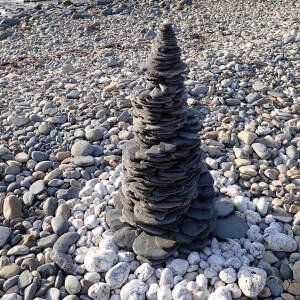Soft, hard and... unacceptable?
On the beach this evening I thought I spotted a transparent plastic bowl floating in to the foreshore and went, irritatedly, to pick it out. But it was a jellyfish like this which, when the right side up, resembled a glass lens, but soft. It's a crystal jellyfish* which are "rare in Welsh waters" but have been seen in Cornwall in recent years. (Their arrival is of course a consequence of warmer sea temperatures.)
The limpet is one of thousands clinging to the rocks with the strength of superglue - which their mucus essentially is: it allows them to withstand up to 100kg of force.
The little shingle beach a couple of miles from us down narrow lanes is rarely busy, known only to locals and coast path walkers; just a handful of people and their dogs were there while we sipped our elderflower cordial in the lowering sunshine.
Someone else had clearly spent a while here though, and left their mark (extra) in the form of a stone tower of admirable proportions: a spiral structure with a limpet shell at the tip and a surround of gleaming quartz pebbles. No amateur endeavour this.
However. Rockpiling is now considered very bad form: not good for the environment and hazardous for wildlife, done mainly for social media purposes it ruins beaches and should be banned, according to some opinions.
See here.
Just a few days ago I enchanged comments with a marine biologist of some repute who was fulminating on a social media platform about an initiative by Dorset Wildlife Trust (I believe) to encourage families to visit beaches by suggesting rock piling as an activity that can be enjoyed by all ages. I said surely the actions of the waves in winter tumble and re-order the conformation of beaches to an extent that human activity on this level cannot match. Haven't sea shore organisms evolved in conjunction with the massive churning and shifting that regularly disrupts their environment? And isn't it better for people to engage with natural elements that sit and look at their phones?
He disagreed and gave the example of a rare species of shore life, some sort of arthropod I think, that has vanished from its sole habitat as a result of human activity. [Surely its habitat should have been protected?] He seemed to have a very bleak view of the possibility that members of the general public could ever to value the foreshore for anything but destructive purposes.
Concerned as I am about environmental damage of every kind, I still don't consider the building of stone towers on the beach as a candidate for banning. Let's ban fossil fuels, marine pollution, and bottom trawling first.
(I wonder what David Attenborough thinks?)
* https://www.getoutmore.uk/jelly/crystal.php


Comments
Sign in or get an account to comment.


